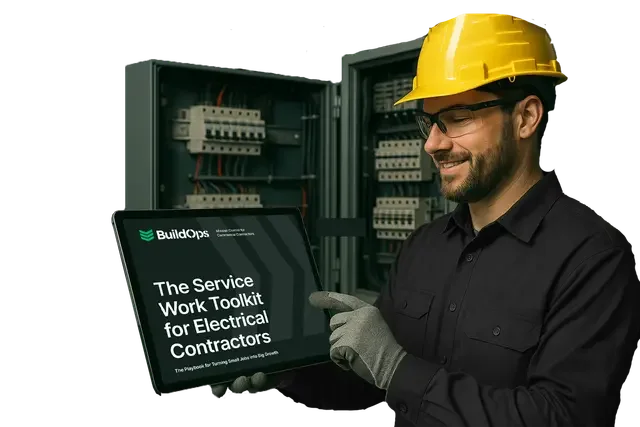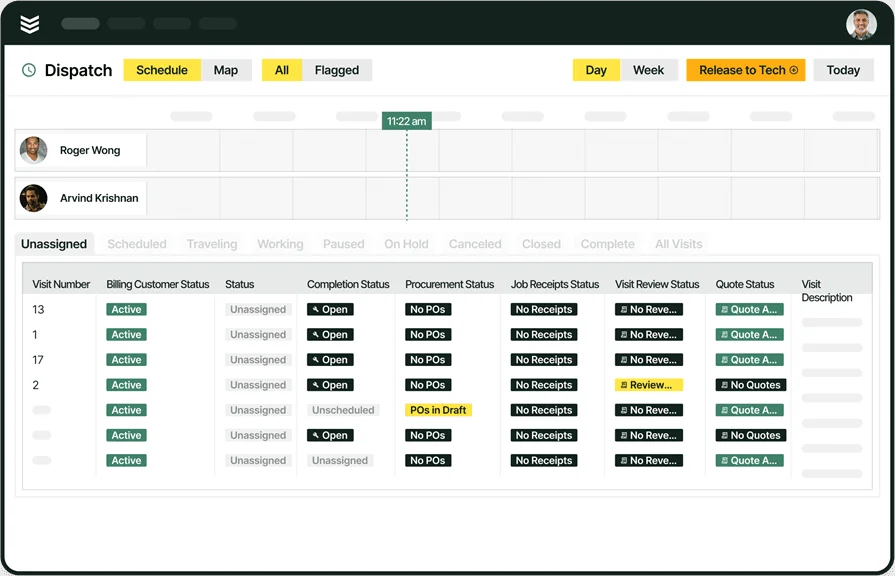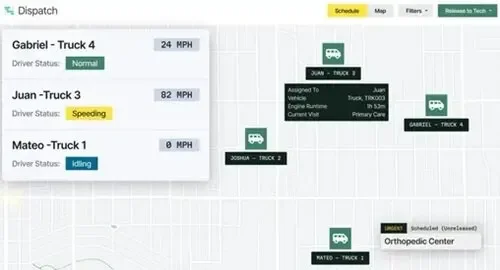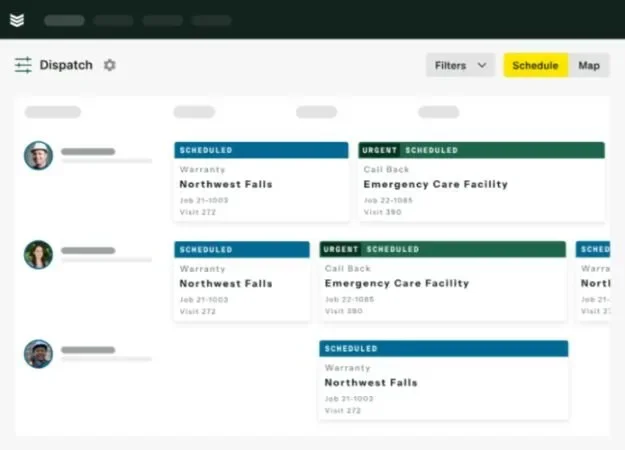Keeping your job board full and your schedule tight takes more than a whiteboard and a few phone calls. If your crew is missing jobs, double-booking appointments, or chasing paper trails, it’s time to switch to a better system. The best electrician booking apps take the guesswork out of your calendar, making it easier to dispatch techs, manage appointments, and stay on top of every job. Whether you're running residential service calls or managing multiple commercial installs, having the right electrical booking app helps you keep projects moving and cash flowing.
If you work in the electrical industry, choosing a booking app tailored to your needs makes a big difference. From features that let techs book on the go to tools that sync jobs with invoicing and CRM, this guide breaks down the top choices—and how to find the best fit for your team. Here’s what we’ll cover:
- Choosing the right electrician booking app for your team
- 6 key features to look for in an electrician booking app
- 5 types of electrician booking apps
- 10 best electrician booking apps for teams and projects of all sizes
- 7 benefits of using an electrician booking app
- 4 important electrician booking app FAQs answered
Finding a solid electrical booking app comes down to how your team works in the field. Let's start by breaking down what to think about when picking one—and how to avoid wasting time (or money) on a platform that doesn’t fit your workflow.
Choosing the right electrician booking app for your team
Electricians don’t have time to babysit their calendars. When you’re juggling service calls, emergency repairs, and preventative maintenance across multiple job sites, your booking app can either keep things tight—or throw your whole day off. The best electrical booking apps give techs in the field the power to manage schedules, lock in appointments, and stay aligned with the office without the back-and-forth.
But not every app fits every team. Some are too clunky. Others are built for salons or general contractors—not crews dealing with service panels, breaker replacements, and last-minute shutdowns. Choosing an electrical booking app built for field electricians means asking the right questions about how your team runs and what your workload actually looks like. Here are the key things to think through before locking in a platform:
- Job volume – How many jobs are you booking each week? Does your crew handle high-frequency service calls, or fewer but longer installs? Can the app scale with demand spikes, like seasonal maintenance work or emergency after-hours calls?
- Team size – Are you booking for a single tech or dispatching across multiple crews? Can the app handle overlapping appointments without double-booking? How easy is it to shift jobs between techs on the fly?
- Service areas – Does your team work across multiple cities or zip codes? Can you assign jobs based on proximity or traffic conditions? Does the app support geo-tagging so dispatch knows exactly where your techs are?
- Office coordination – Can your back office view live job updates? Does the app make it easy to sync with invoicing, customer history, and parts inventory? How clean is the handoff between field notes and billing?
- Features – Does it allow for repeat service call scheduling? Can techs confirm, cancel, or reassign appointments in the field? Does it support custom time blocks for installs, inspections, or emergency work?
Locking in an electrical booking app that matches how your crew operates in the field can save hours every week. Up next, we’ll break down the core features electricians should expect from a tool that books, tracks, and manages field service jobs without the chaos.
6 key features to look for in an electrician booking app
Electricians working in the field don’t have time to toggle between apps, search through text threads, or guess who’s handling what. The booking app they use needs to cut through that noise. A strong electrical booking app doesn’t just fill in a calendar—it connects the office with the field, keeps techs on track, and supports the entire service cycle from the first job to the final invoice.
Whether you're dispatching crews to urgent panel repairs or scheduling maintenance for a commercial building’s electrical system, your app should handle all of it without slowing your team down. These are the features that make the biggest impact on how electrical service teams run their day from the field.
1. Smart dispatching
A great electrical booking app must include a field-ready dispatching system. It should allow office staff to assign, adjust, and oversee jobs in real time—ideally with drag-and-drop scheduling and live tech locations. For example, say your crew is handling power loss in a downtown office, but another emergency call comes in from across town. With a strong field service dispatching tool, you can reroute the closest available tech, adjust the rest of the day’s bookings, and notify the customer—all without a single phone call. That kind of flexibility keeps your crew moving and customers happy.
2. Service agreement integration
For electricians doing regular maintenance work, recurring visits are the norm. Your electrical booking app needs to work with ongoing service agreements, automatically scheduling inspections, testing, or routine maintenance without starting from scratch each time. Say your team manages monthly lighting maintenance at a multi-story office building. Service agreement management makes sure those jobs hit the calendar automatically—no reminders, no missed dates. This keeps maintenance work consistent, and makes sure nothing slips through the cracks.
3. CRM access for field teams
Electricians often show up to a site where they’ve been before—but without the full job history, details can get lost. A reliable electrical booking app should connect to a CRM that gives techs real-time access to customer info, past service calls, and contact notes. Let’s say a tech rolls up to a manufacturing facility for a panel fault, only to find out it’s tied to a breaker issue logged two visits ago. With a contractor CRM, they can check service notes on the spot, spot patterns, and handle the root cause without delay.
4. Time tracking built into the field app
Time matters when you’re running back-to-back service calls. Your electrical booking app should include built-in time tracking tools that techs can use without leaving the job screen. This keeps billing accurate and records solid. Take a tech handling a full-day install across multiple breaker panels. By tracking hours through the booking app itself, there's no need for manual logs or missed hours. That keeps payroll tight and helps estimate future jobs better.
5. Integrated quoting tools
An electrical booking app should do more than just schedule—it should help you win the next job. That’s where electrical quoting tools come in. The app should let techs build quotes right after walkthroughs and attach them to bookings for follow-up. Say your tech finishes a service call at a school and spots outdated exit lighting throughout the hallways. Instead of waiting, they generate a quote for upgrades right from the app and send it before they leave the lot. That speed wins jobs and keeps the calendar full.
6. Clean invoicing and payment tracking
Once the job’s done, your electrical booking app should let you wrap it up quickly. That means generating an invoice from the completed job, pulling hours and parts, and logging it right away. Bonus if it connects to field service payment collection tools that give customers easy ways to pay. For instance, after troubleshooting a facility’s backup power, your tech finishes the job and sends the invoice before even packing up the van. The customer pays online through a card link, and the job closes without chasing payments days later.
Other notable features to watch for in an electrician booking app
While the core functions of an electrical booking app should handle scheduling, dispatch, quoting, and invoicing, some additional features can give your team a sharper edge in the field. These aren’t always dealbreakers, but they do add value—especially for electricians looking to manage operations more efficiently at scale. If you’re comparing tools, these extras are worth keeping an eye on.
- Fleet visibility tools – Fleet tracking features help dispatchers and managers monitor vehicle locations, optimize routes, and respond faster when emergency calls come in. For electrical service teams managing multiple vans or trucks, this adds a layer of control and efficiency to the booking experience.
- Lead tracking and sales pipeline – A good pipeline management features keeps tabs on incoming leads and potential job opportunities. It helps prioritize high-value projects and gives visibility into which estimates need follow-up—useful for teams using the electrical booking app to close more work.
- Workload reporting and job insights – Built-in field service reporting tools provide visibility into job volume, performance trends, and technician output. These dashboards help business owners and ops teams spot where bookings are falling off, and where demand is peaking—critical data for growth planning.
Not all electrical booking apps are built the same—and the differences matter. Some are lightweight tools built for solo techs, while others offer full platforms that support large service teams. Before you pick a system, it’s worth understanding what types are out there and how they line up with the way your electricians handle jobs in the field.

Book more jobs with precision
Access process guidelines, real-life examples, and templates to improve scheduling.
5 types of electrician booking apps
There’s no one-size-fits-all when it comes to electrical booking apps. What works for a solo residential contractor might fall short for a team managing high-volume service calls across multiple cities. Understanding the types of booking platforms out there helps you spot which ones can actually handle your crew’s pace, job types, and daily grind in the field. Each type of app has a different approach to how it stores data, manages access, and supports field service workflows.
Here’s a breakdown of the five main types of electrician booking apps:
- Cloud-based – These apps store data online and update in real time across all devices. Crews and office staff can log in from anywhere—ideal for electricians constantly on the move. What sets this type apart is how it supports live scheduling, real-time job updates, and remote access without needing to install anything on a local server. Cloud-based tools are built for speed and flexibility, which is crucial when job details change mid-day.
- Web-based – A close cousin to cloud-based systems, web-based apps run directly through a browser. They don’t require downloads or installations and are often simpler to deploy. They’re perfect for smaller electrical teams looking for lightweight access across devices, but they may not offer as many integrations or offline capabilities. What makes them distinct is ease-of-use—often faster to get started with, but limited when scaling up complex workflows.
- On-premise – These apps are installed and run on local servers or computers. They offer full control over data security and customization, which some large firms or government contractors require. However, updates and maintenance are entirely up to the user, and access is usually restricted to in-office environments. What makes on-premise systems stand out is the level of internal control and ownership over infrastructure—but at the cost of flexibility.
- All-in-one FSM (Field Service Management) – These platforms do more than just bookings. They combine scheduling, dispatch, quoting, invoicing, asset tracking, and reporting in one place. For electricians managing complex jobs or high volumes, this type of system eliminates the need to juggle multiple tools. The key difference is consolidation—this is a full-service operational hub, not just a calendar.
- Mobile-first apps – Built primarily for phones and tablets, these are tailored to techs in the field. They focus on fast tap-based scheduling, job notes, and quick communication, with less emphasis on deep office workflows. This type stands out for its simplicity and accessibility, especially for small crews or contractors working job-to-job. They’re perfect when mobility and ease of use outweigh the need for back-office depth.
Now that you’ve got a clear view of the types of platforms out there, let’s dive into the best electrician booking apps on the market today—and which ones are built to handle the real demands of field service work.
10 best electrician booking apps for teams and projects of all sizes
Finding a reliable electrical booking app doesn’t just come down to flashy features—it’s about how well the tool handles day-to-day demands in the field. Whether you’re managing recurring maintenance jobs, emergency calls, or multi-tech installations, your booking system needs to back up your field crew and sync seamlessly with your office. Here are 10 of the best electrician booking apps available right now, broken down by specialization and what they actually bring to the job.
1. Best for commercial: BuildOps
BuildOps is designed specifically for commercial electrical contractors managing complex service work, recurring maintenance, and high-volume scheduling. Its cloud-based platform supports real-time dispatching, automated job workflows, technician tracking, and end-to-end visibility from quote to invoice.
App type: Cloud-based / Web-based
How pricing works: Custom quote based on team size, usage, and required features
Features beyond booking: Built-in quoting tools, time tracking, project reporting, CRM access, invoicing, and service agreements
What sets it apart for commercial: BuildOps focuses on end-to-end field service operations, not just scheduling. It helps electrical teams handle backlogs, service contracts, and multiple job phases across projects—all from one connected platform. It’s tailored for commercial jobs that require coordination, compliance tracking, and real-time communication between the field and office.

Book jobs faster with BuildOps
Take control of electrical bookings, streamline operations, and complete more jobs.
2. Best for residential: SimplyBook
SimplyBook offers a clean and customizable platform designed for individual electricians and small residential teams. It supports online bookings, automated reminders, and service add-ons that help simplify day-to-day scheduling. Users can build a branded booking page and manage client appointments through desktop or mobile. However, SimplyBook may not be the best fit for commercial teams or contractors managing more complex job workflows.
App type: Cloud-based / Web-based
How pricing works: Free basic tier, paid plans start at $9.90/month
Features beyond booking: Calendar syncing, customizable intake forms, online payments, email and SMS reminder
What sets it apart for residential: This app makes it easy for electricians to create a seamless customer experience, with booking options right on a website or social media page. Ideal for residential techs who need something lightweight and fast.
3. Best for general contractors: ServiceM8
ServiceM8 is built for trade contractors juggling fieldwork, quoting, and customer communication all at once. It supports real-time job dispatch, quoting from the field, photo capture, and even digital checklists. Electricians can access schedules and job details right from their mobile device and keep everything organized in one system. That said, it may not scale well for large electrical operations handling hundreds of jobs, multi-crew schedules, or complex reporting needs.
App type: Cloud-based / Web-based
How pricing works: Tiered pricing based on active jobs per month, starting at $9/month
Features beyond booking: Voice-to-text job notes, job checklists, field quoting, CRM integrations
What sets it apart for general contractors: ServiceM8 gives electricians and contractors a simple but powerful way to manage their field service workflow while still staying lean. It works especially well for smaller teams that don’t need enterprise-level complexity.
4. Best for small to mid-sized businesses: BookedIn
BookedIn gives small electrical teams a simple way to accept online bookings, manage calendars, and send appointment confirmations without getting bogged down in complex software. It focuses on getting jobs on the books fast, with easy setup and a clean user interface. That said, larger operations may find it lacking when it comes to advanced service workflows or reporting features.
App type: Cloud-based / Web-based
How pricing works: Tiered pricing starting at $24/month based on users and appointments
Features beyond booking: Automated reminders, mobile access, client history, team scheduling
What sets it apart for small to mid-sized businesses: BookedIn is ideal for electricians who want to move off of paper or spreadsheet scheduling. Its user-friendly design and reliable reminder system make it a good fit for teams that need structure without heavy back-office complexity.
5. Best for independent contractors: Setmore
Setmore offers solo electricians and small contractors a free booking tool that supports calendar syncing, basic CRM functions, and online payments. It includes a branded booking page and integrates with popular tools like Zoom and Square. However, its features may be too limited for electricians managing teams, contracts, or ongoing maintenance schedules.
App type: Cloud-based / Web-based
How pricing works: Free tier available; premium plans start at $12/user/month
Features beyond booking: Calendar integration, customizable booking pages, SMS/email reminders, online payments
What sets it apart for independent contractors: Setmore gives independent electricians the ability to accept and manage appointments with little to no setup cost. It's especially useful for one-person operations that need a professional appearance without the expense.
6. Best for multi-trade contractors: Workiz
Workiz supports businesses offering multiple trades—including electrical, HVAC, and plumbing—with tools that handle scheduling, dispatch, and call tracking. It’s designed to keep all job types organized under one roof, with role-based access for different teams. However, for companies doing only electrical work, the extra features may feel unnecessary or overbuilt.
App type: Cloud-based / Web-based
How pricing works: Starts at $225/month for teams of up to 5 users
Features beyond booking: VoIP integration, call tracking, inventory management, technician status updates
What sets it apart for multi-trade contractors: Workiz is especially useful for businesses that manage diverse services. Its all-in-one interface lets electricians book jobs alongside other trades without tool-switching.
7. Best for mobile-first electricians: OctopusPro
OctopusPro was built for field service pros who rely on mobile tools to manage jobs, update schedules, and process payments on the go. The app gives electricians direct access to everything they need from the field, reducing calls to the office. Still, teams needing more robust reporting or office-facing tools may find it missing a few essentials.
App type: Cloud-based / Web-based
How pricing works: Plans start at $29/month with options based on user count and services offered
Features beyond booking: Mobile payments, GPS tracking, real-time job status, customer messaging
What sets it apart for mobile-first electricians: OctopusPro stands out by prioritizing mobile functionality. Electricians can update job statuses, collect signatures, and even invoice right from their phones.
8. Best for calendar integration: Calendly
Calendly gives electricians a straightforward way to share availability and let clients book directly into their schedule. Its strength lies in syncing with major calendar platforms like Google Calendar, Outlook, and iCloud, helping avoid overlaps or double bookings. However, it lacks the field-service-specific tools electricians often need, like dispatching, time tracking, or service agreement scheduling.
App type: Cloud-based / Web-based
How pricing works: Free plan available; paid plans start at $10/month
Features beyond booking: Calendar syncing, automated notifications, buffer time, integration with Zoom and Stripe
What sets it apart for calendar integration: Calendly simplifies coordination between your personal calendar and your field booking tool. For electricians juggling service calls and customer meetings, it's a clean solution for syncing availability.
9. Best for standalone booking: Picktime
Picktime is a lightweight scheduling solution designed to make basic booking fast and intuitive. It supports unlimited appointments, team member calendars, and location-specific scheduling—all through a clean dashboard. That said, it doesn’t offer the robust reporting, quoting, or workflow automation needed by larger electrical teams.
App type: Cloud-based / Web-based
How pricing works: Free for basic features; pro plans start at $3/user/month
Features beyond booking: Team calendar sync, SMS/email alerts, location-based bookings, recurring appointments
What sets it apart for standalone booking: Picktime works well for electricians who only need core booking features without diving into broader field service management. It’s especially useful for solo contractors or temporary job schedulers.
10. Best for booking integrations: Riser
Riser focuses on flexibility, letting users integrate its booking tools into various business platforms—websites, CRMs, and social media pages. Electricians can easily embed their booking forms or link them via email and marketing campaigns. Still, Riser may feel limited when it comes to full job management or field-focused functions that electricians use on the ground.
App type: Cloud-based / Web-based
How pricing works: Free plan with core features; premium plans start at $12/month
Features beyond booking: Website embedding, API access, SMS/email reminders, calendar syncing
What sets it apart for booking integrations: Riser makes it easy to plug booking capabilities into whatever system you already use. That’s ideal for electricians who rely heavily on existing business tools but still want a clean scheduling layer.

Explore BuildOps Scheduling
Book more electrical jobs—and make sure they get done on time.
7 benefits of using an electrician booking app
Using an electrical booking app goes beyond just scheduling—it directly improves how electricians manage their day-to-day operations. From reducing job confusion to making communication tighter between the field and office, a solid app clears the clutter and gives techs the tools to focus on what matters: getting jobs done.
These benefits are especially useful for teams handling high call volumes, emergency service, or regular maintenance rounds.
1. Fewer missed appointments
Automated confirmations, calendar syncing, and instant reminders help keep jobs on track. Electricians stay updated in real time, which cuts down on no-shows, double bookings, and last-minute changes that eat into billable hours.
2. Faster job turnaround
The quicker your crew gets job details, the faster they can respond. An electrical booking app keeps schedules tight, updates instantly, and helps field teams move from one call to the next without waiting on office instructions. Tools like this electrical contractor scheduling app help cut the time between dispatch and resolution.
3. Stronger customer relationships
Giving customers a smooth way to book, reschedule, or get notified builds confidence. Whether it’s for a simple panel check or an emergency repair, techs showing up informed and on time make a strong impression. These touchpoints often lead to repeat business and positive word-of-mouth.
4. Better visibility across the team
Everyone on the crew—whether in the office or out in the field—can see what’s happening as jobs unfold. From tracking open calls to knowing which tech is nearby, it helps dispatch stay sharp and responsive. Electricians who use platforms connected to an electrical contractor CRM get an added layer of clarity for managing relationships and schedules in one place.
5. Easier quoting and follow-ups
When techs can create quotes right after a walkthrough, they close jobs quicker. A strong electrical booking app connects booking with quoting, giving your team a fast way to capture revenue opportunities without extra admin steps. Contractors looking for quoting tools often benefit from options like this electrical quote app, which pairs well with booking flows.
6. Smarter bidding for new work
Tying your booking system to tools that support estimating and proposal generation gives your team a faster way to respond to bids. Electricians can build schedules around pending jobs and avoid overcommitting during busy seasons. For those seeking more structure, this electrical bidding app supports that kind of workflow.
7. A toolbox that keeps evolving
Some of the best apps now connect booking with tools for quoting, dispatch, payments, and reporting. Teams that use solutions like those featured in this list of the best electrical apps often find new ways to speed up everyday work. It’s not just about adding software—it’s about having one place to manage everything your crew handles in the field.
4 important electrician booking app FAQs answered
Whether you're running a small electrical crew or managing dozens of techs across service zones, picking an electrician booking app isn’t just about convenience—it’s about keeping your field operation tight and your schedules reliable. Electricians rely on booking tools that work just as hard in the field as they do in the office, and understanding how these apps actually support day-to-day work is key.
Below are four of the most common questions electricians ask before making the switch.
1. What is an electrician booking app?
An electrician booking app is a tool that helps electrical contractors manage job scheduling, dispatching, and service bookings in one place—designed specifically for field service work. It gives your team one system to assign, confirm, and adjust jobs without the back-and-forth calls or paperwork.
These apps are built to support how electricians actually operate. Instead of using whiteboards or spreadsheets, teams can assign jobs, update schedules, and communicate changes on the fly. The app becomes the central hub for job tracking, from first call to final invoice.
2. How do booking apps for electricians work?
Electrician booking apps manage job scheduling from both the office and the field. Here's how they typically function:
- Dispatchers assign jobs and update schedules in real time
- Techs receive job details, addresses, and customer info on their mobile device
- Customers get automatic confirmations and reminders
- Completed jobs sync with invoicing, quotes, or CRM tools
Some systems also handle route optimization, job notes, photo uploads, and payment collection. The key is keeping everything connected—from the first appointment to final job closeout.
3. Is a booking app worth the cost for electricians?
Yes—for most electricians, the time and money saved through automation, fewer errors, and faster job turnover often offset the cost. When you eliminate missed appointments, double-bookings, or wasted dispatch time, the ROI becomes clear.
For smaller shops, even a basic electrician booking app can reduce overhead. For larger teams, the added visibility and scheduling control helps streamline daily operations, reduce callbacks, and boost capacity. The long-term gains in productivity often outweigh the upfront price.
4. Best practices for implementing an electrician booking app
Rolling out a new booking system doesn’t have to be disruptive—if you follow a few proven steps. Here are 10 best practices for electricians adopting a booking app:
- Start with a pilot crew – Test the tool with a few techs to work out kinks
- Set clear roles – Define who books, who dispatches, and who monitors the system
- Use job templates – Standardize service types to speed up scheduling
- Integrate with your CRM or invoicing tools – Connect it to other systems you rely on
- Train your field team – Make sure techs are comfortable using it on mobile
- Enable reminders – Reduce no-shows by automating customer alerts
- Track performance – Monitor how job completion and booking times improve
- Get customer feedback – Use reviews to fine-tune your booking flow
- Keep it updated – Schedule checks to clean up old jobs or missed entries
- Choose a system that can scale – Pick a booking app that grows with your business
Following these steps helps ensure your new electrician booking app fits how your team actually works—saving you time, tightening up operations, and keeping every crew member on the same page.

Get the software scoresheet
Accurately compare electrician booking software with our simple scoresheet.
Finding an electrician booking app that actually fits the way your team works in the field isn’t always easy. Plenty of tools promise scheduling help—but few bring together the full package electricians need, from quoting and CRM to dispatch, invoicing, and reporting. Most of the features covered in this guide aren’t standard across booking platforms. But BuildOps isn’t like most tools.
It was built specifically for electrical contractors who manage complex service workflows, recurring maintenance, and fast-moving field teams. It connects every part of the job—from first appointment to final invoice—into one place, so your techs and office crew stay in sync.

Want to see how it works?
We help teams manage scheduling — and everything that comes after.








